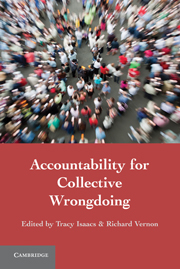Book contents
- Frontmatter
- Contents
- List of Contributors
- Acknowledgments
- Introduction
- PART I COLLECTIVE ACCOUNTABILITY IN INTERNATIONAL LAW
- 1 Collective Responsibility and Postconflict Justice
- 2 State Criminality and the Ambition of International Criminal Law
- 3 Punishing Genocide: A Critical Reading of the International Court of Justice
- 4 Joint Criminal Enterprise, the Nuremberg Precedent, and the Concept of “Grotian Moment”
- 5 Collective Responsibility and Transnational Corporate Conduct
- 6 Collective Punishment and Mass Confinement
- PART II DISTRIBUTING ACCOUNTABILITY
- Index
- References
5 - Collective Responsibility and Transnational Corporate Conduct
Published online by Cambridge University Press: 05 June 2012
- Frontmatter
- Contents
- List of Contributors
- Acknowledgments
- Introduction
- PART I COLLECTIVE ACCOUNTABILITY IN INTERNATIONAL LAW
- 1 Collective Responsibility and Postconflict Justice
- 2 State Criminality and the Ambition of International Criminal Law
- 3 Punishing Genocide: A Critical Reading of the International Court of Justice
- 4 Joint Criminal Enterprise, the Nuremberg Precedent, and the Concept of “Grotian Moment”
- 5 Collective Responsibility and Transnational Corporate Conduct
- 6 Collective Punishment and Mass Confinement
- PART II DISTRIBUTING ACCOUNTABILITY
- Index
- References
Summary
Corporations and other business enterprises are sometimes implicated in conduct that is considered criminally wrongful. At the domestic level, debates over corporate criminal liability often focus on the merits of holding corporations responsible for criminally wrongful conduct, as opposed to, or in addition to, convicting individuals for their role in the commission of corporate crimes. A second debate in the domestic context is over the significance of the distinction, if any, between a criminal and a regulatory offense when it comes to prosecuting and penalizing a legal person such as a business entity. In the international human rights context, however, the debates have focused on a different issue: whether corporations bear direct obligations under international human rights law for wrongful conduct that falls short of violating the egregious norms of international criminal law. This somewhat heated debate was recently settled at the United Nations Human Rights Council with the acceptance by states in June 2008 of the Framework for Business and Human Rights developed by the Special Representative to the UN Secretary-General on Business and Human Rights, Professor John Ruggie. Curiously, it is international criminal law's preference for individual responsibility for mass crimes such as genocide that has opened the door to recognition of the legal responsibility of the corporation – a collective – for egregious human rights violations, while keeping the legal door closed where less serious human rights violations are concerned.
- Type
- Chapter
- Information
- Accountability for Collective Wrongdoing , pp. 140 - 168Publisher: Cambridge University PressPrint publication year: 2011
References
- 3
- Cited by

